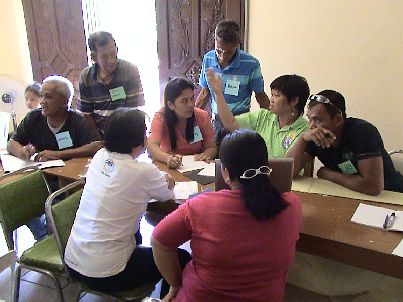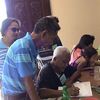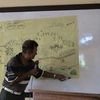On April 19 and 20, 2012, the Marinduque Council for Environmental Concerns (MACEC), ANSA EAP’s partner on social accountability in the extractive industry, convened a 2-day writeshop to draft a case study report on their experience in implementing a Community Scorecard (CSC). The writeshop had 30 participants coming from the municipal government of Buenavista, barangay captains and councilors, MACEC leaders, representatives of the Department of Environment and Natural Resources (DENR), and the provincial mining regulatory board.
The focus of the CSC was the provincial resolution that declared a 50-year mining moratorium for the entire province of Marinduque, specifically how information on the resolution has been made accesssible and transparent to the 15 barangays in the municipality of Buenavista.
The first hangkaan session was a community mapping exercise, an appreciation of the community resources including the most coveted minerals that dot the upland ecosystems. The potential negative impact on the coastal ecosystem, on which many families live and depend, upon the advent of artisanal and small scale mining.
The community map will form part of the Introduction of the case study, as will the demographics and resource assessment. The participants pored through the documentation of the CSC process – from the drawing up of the input tracking matrix , the community indicators and scoring system, and the interface meeting.
In subsequent hangkaan sessions, the usefulness of the CSC as a social accountability tool was assessed, i.e., can it be a tool for promoting transparency, accountability and participation? Can it be a springboard for constructive engagement and citizen/community monitoring of a local ordinance, resolution, or a policy?
The CSC, one participant noted, if done correctly and with openness by government officials, can be used to check how people look upon their performances (are they delivering on their commitments to provide services and programs, to consult and give voice to the local people)?
In the context of the provincial resolution on the mining policy, the writeshop observed that the community leaders and government officials need to continually provide information on people’s rights and entitlements to clean and safe environment and to sustained biodiversity so that the youth and vulnerable sectors of the community will develop an appreciation of their natural resources.
*‘Hangkaan’ is the Marinduquenos’ term for Conversations, more commonly referred to as Kapihan or Tsaahan, to discuss issues of the day, among almost everyone who is interested to engage in an exchange of thoughts, opinions or experience. Hangkaan transposed from Knowledge Cafe, a discussion methodology where participants are brought together in a series of conversations with focused agenda. Kapihan or Tsaahan are the more frequently used terms.



